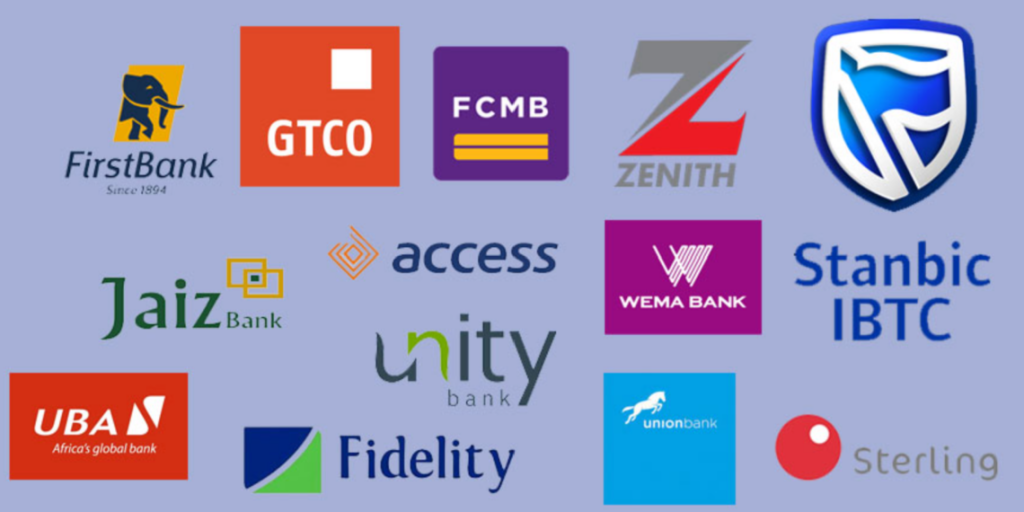
With mounting economic headwinds reshaping Nigeria’s financial landscape and taking a toll on interest income, banks are charting new paths to profitability.
Nigerian banks are undergoing a profound shift in their business models as they move away from their traditional reliance on lending to explore new revenue streams.
This transformation is not just a response to the challenges posed by the volatile economic environment but also a deliberate effort to diversify income sources and position themselves for long-term growth.
Historically, Nigerian banks have relied heavily on interest income from loans and investments in government securities. However, with the current economic challenges – such as inflation, currency devaluation and regulatory changes – this traditional model has become less sustainable.
As a result, Nigerian banks are increasingly turning to non-interest income sources such as digital banking, foreign exchange gains, and service fees to bolster profitability.
Leading the charge in this transformative shift are banks like United Bank for Africa (UBA), Guaranty Trust Holding Company (GTCO), Zenith Bank, AccessCorp, ETI, First City Monument Bank (FCMB), Fidelity Bank, Stanbic IBTC and Wema Bank.
These institutions have shown remarkable financial performance in 2024, with their ability to blend traditional banking with digital and transaction-driven services. This move towards a diversified revenue model is not only improving their financial stability but also positioning them to remain competitive in a rapidly evolving global financial ecosystem.
UBA’s strategic expansion, revenue diversification
United Bank for Africa (UBA), one of Nigeria’s largest and most prominent financial institutions, exemplifies the shift away from traditional banking practices. In its audited financial results for 2024, UBA reported a significant surge in gross earnings, which rose by 53.6 per cent to N3.19 trillion, up from N2.08 trillion in 2023. This performance highlights the bank’s strategic focus on diversification. Profit before tax reached N803.72 billion, and profit after tax grew by 26.1 per cent to N766.6 billion. The bank’s total assets surged to N30.4 trillion, reflecting a 46.8 per cent increase from the previous year.
Historically, UBA’s profits have been heavily reliant on interest income from loans and government securities. However, the bank has successfully shifted its focus towards digital banking and foreign exchange operations.
With its pan-African presence, UBA has capitalised on cross-border transactions, forex trading, and digital banking services, significantly increasing its non-interest income. The growing adoption of mobile payments and online banking services has also contributed to higher fee-based revenues, helping UBA weather fluctuations in interest rates and loan defaults.
By investing in digital payment systems and enhancing its digital banking infrastructure, UBA has built a more resilient financial model that is less dependent on interest income.
GTCO’s historic profit milestone
GTCO is another example of how Nigerian banks are evolving. In 2024, GTCO reached a historic profit milestone, reporting a pre-tax profit of N1.3 trillion. This was a substantial increase, underscoring the bank’s success in balancing its traditional banking services with its growing non-interest income streams.
Customer deposits rose to N10 trillion, reflecting a 44 per cent increase from the previous year. Shareholders’ funds also grew significantly, jumping by 83.6 per cent to N2.712 trillion.
What sets GTCO apart in 2024 was its impressive expansion in non-interest income, particularly through digital banking. Net fees and commission income surged by 73.4 per cent and e-business revenue grew significantly.
GTCO’s strategic investment in digital banking infrastructure has allowed it to tap into mobile banking solutions, merchant services, and fintech collaborations, boosting its overall revenue. This shift towards non-interest income has proven to be highly profitable for the bank, making it less dependent on traditional lending while positioning it for sustained growth.
Ecobank’s digital strategy and diversified earnings
Ecobank Transnational Incorporated (ETI), a leading pan-African financial services group, has made significant strides in repositioning itself as a modern banking powerhouse. In 2024, the group posted a profit after tax of N735.9 billion, marking a 179 per cent increase from the previous year. Pre-tax profit more than doubled to N980.7 billion, showcasing the effectiveness of its strategy.
Central to Ecobank’s success has been its digital transformation. The bank has invested heavily in mobile banking, agency networks, USSD channels, and the Ecobank Mobile app, which have enabled the bank to reach a larger, more diverse customer base. These platforms have not only enhanced financial inclusion but also created low-cost, high-frequency transaction streams that have driven significant fee and commission income.
In addition, Ecobank’s ability to manage foreign exchange volatility across its multi-jurisdictional operations has been a major contributor to its profitability. By leveraging cross-border trade flows and currency fluctuations, Ecobank has strengthened its earnings and diversified its revenue base, positioning itself as a leader in Africa’s banking sector.
Fidelity Bank’s exceptional growth
Fidelity Bank’s financial performance in 2024 further underscores the growing trend of non-interest income reliance. The bank reported a remarkable 210 per cent increase in profit before tax, which soared from N124.3 billion in 2023 to N385.2 billion in 2024. Gross earnings surged by 87.7 per cent to N1.043 trillion, with non-interest income playing an increasingly important role in this growth.
Fidelity Bank’s focus on enhancing its digital banking capabilities has paid off, allowing it to tap into a broader customer base. This expansion has led to higher transaction-based revenue, driven by digital banking services and fee income. Fidelity’s ability to grow its non-interest income while maintaining a strong focus on asset quality has made it one of the standout performers in Nigeria’s banking sector.
Zenith Bank rides on digital gains
Zenith Bank is another institution that has embraced the digital transformation sweeping through Nigeria’s banking sector. In its 2024 results, Zenith Bank reported a profit after tax of N1.03 trillion, a 52.5 per cent increase from 2023.
Its pre-tax profit rose sharply to N1.32 trillion, marking a new high for the bank. Zenith’s success can be attributed to its innovative use of digital banking platforms, which have driven fee-based income.
The bank also capitalised on foreign exchange trading, leveraging currency volatility to boost trading income. Service fees, including charges for digital payments, also contributed significantly to Zenith’s impressive results. By reducing its dependence on interest income and embracing technology-driven growth, Zenith Bank has positioned itself as a key player in Nigeria’s evolving financial landscape.
AccessCorp’s focus on digital revolution
Access Holdings is another bank that has benefited from its pivot towards a diversified revenue model. In its 2024 financial results, the bank reported a pre-tax profit of N867.02 billion, up from N729 billion the previous year. Gross earnings surged to N4.9 trillion, reflecting the bank’s expanding revenue capacity.
Access Holdings has capitalised on its robust digital infrastructure, offering mobile banking, internet banking, payments, and agency banking services to a growing customer base.
These digital services have generated substantial non-interest income through transaction fees and commissions. The bank’s ability to manage foreign exchange volatility and expand its presence in Africa and international markets has further boosted its profitability.
Stanbic IBTC’s diversified revenue model
Stanbic IBTC Holdings Plc also posted strong financial results, with total assets increasing by 34 per cent to N6.9 trillion as of December 31, 2024, while profit before tax rose by 60.2 per cent to N303.8 billion.
The bank’s 109.3 per cent surge in total interest income was complemented by significant non-interest revenue streams, particularly in digital banking fees and wealth management services. Stanbic IBTC’s strategic expansion into financial technology and digital banking has strengthened its position as a key player in Nigeria’s evolving banking sector.
FCMB’s balanced growth strategy
FCMB’s strong financial performance for the year ended December 31, 2024, highlights the banking sector’s ongoing shift toward revenue diversification. Gross earnings increased by 53.9 per cent to N794.8 billion, while profit before tax rose by 12.3 per cent to N117.2 billion.
The bank’s total assets reached N7 trillion, with loans and advances expanding to N2.3 trillion. While interest income remains a key driver of FCMB’s profitability, non-interest income is becoming an essential pillar of its financial strategy.
The bank has aggressively pursued transaction fees, forex earnings, and digital banking revenues, which have contributed significantly to its overall earnings.
Foreign exchange gains played a crucial role in FCMB’s 2024 performance, with naira devaluation and increased forex transactions boosting income. The bank’s expansion in financial technology and agency banking has also driven higher transaction volumes, reinforcing the industry-wide transition toward cashless banking.
Wema Bank’s record-breaking performance
Wema Bank has also made significant strides in diversifying its revenue streams. In 2024, the bank reported a remarkable 141 per cent increase in profit before tax, reaching its highest level in history. This growth was driven by strong interest income, but the real standout was the bank’s success in digital banking.
Wema’s ALAT digital banking platform has played a central role in its success, enabling the bank to reach new customers and generate increased transaction volumes. By focusing on digital services, forex gains, and service fees, Wema Bank has effectively reduced its reliance on traditional lending.
The broader shift to non-interest income
Across the Nigerian banking landscape, the shift toward non-interest income sources is gaining momentum. Banks are increasingly incorporating digital banking, fintech partnerships, and transaction-based services into their business models. Traditional banking practices, such as lending and government securities, are no longer sufficient to sustain profitability in an increasingly volatile economic environment.
The rise of mobile banking, USSD services, point-of-sale transactions, and digital payments has provided Nigerian banks with new avenues for revenue generation. Foreign exchange activity has also become a key driver of profitability, particularly as the naira’s devaluation has increased forex transaction volumes.
The future banking and profitability
Looking ahead, Nigerian banks are expected to continue investing heavily in digital banking, fintech collaborations, and diversified revenue models. The integration of seamless mobile and internet banking services will be crucial to attracting new customers and expanding fee income. As the financial landscape continues to evolve, banks that embrace these shifts will not only survive but thrive.
Regulatory changes, such as the Central Bank of Nigeria’s increased capital requirements, will further shape the future of Nigerian banking. With stronger balance sheets and increased consolidation through mergers and acquisitions, Nigerian banks are well-positioned to become regional and global players in the financial sector.
Financial analysts from leading firms like Vetiva Capital Management, Afrinvest, and Cordros Capital have highlighted a significant shift in the way Nigerian banks are strengthening their profitability, focusing increasingly on activities beyond traditional lending.
Vetiva Capital Management has pointed out that banks are successfully capitalising on the gains from foreign exchange revaluation and the elevated interest rate environment. This strategic move has allowed key players such as Zenith, GTCO, and UBA to significantly boost their profits.
The recent lifting of the N2 billion daily cap on the Central Bank of Nigeria’s Standing Deposit Facility has also provided banks with more room to deposit excess liquidity, further enhancing their interest income.
Vetiva forecasts that Nigerian banks could see a 15.75 per cent yield on their assets in 2024, a notable increase from the previous 11.75 per cent. This uptick reflects the growing focus on non-lending income sources as banks adapt to the evolving economic landscape.
Meanwhile, Afrinvest has reported an 18.4 per cent growth in Nigeria’s financial sector in real terms between Q3 2023 and Q1 2024, positioning it as the fastest-growing sub-sector of the Nigerian economy.
This growth is largely attributed to the expansion of digital banking, favourable interest rates, and the influx of foreign currency gains, particularly in the aftermath of the naira devaluation.
Afrinvest also highlights the growing importance of banking recapitalisation, especially as Nigeria sets its sights on achieving a $1 trillion economy by 2032. The new capital requirements for the banking sector are essential for ensuring the strength and stability of the financial system moving forward.
Cordros Capital has further emphasised the shift in profitability for banks like Access Bank, which has seen impressive growth in interest income, driven by higher lending activities and robust returns from fixed-income investments.
Access Bank’s interest income rose by 21.5 per cent to N571.98 billion, largely due to its loans and investment securities. Additionally, the bank’s non-interest income surged by 50.3 per cent, fueled by foreign exchange gains, fees, commissions, and investment securities. This highlights the significant role that non-interest income is playing in driving overall profitability.
Indeed, analysts from these financial firms agree that Nigerian banks strategically diversify their income sources. By moving beyond the traditional reliance on lending, they are capitalising on digital banking, asset management, and capital market activities. This shift not only helps banks navigate the current challenges in the banking environment but also positions them for more sustainable profitability in the long term.
The 2024 financial results of leading Nigerian banks highlight a transformative shift in the banking industry. By diversifying income sources and embracing digital innovation, these banks are building more resilient and sustainable business models. The successful integration of traditional financial intermediation with digital finance, forex gains, and fee-based services marks the beginning of a new era in Nigerian banking, one driven by innovation, profitability and long-term growth.






